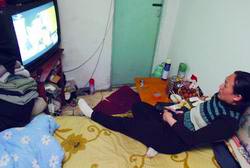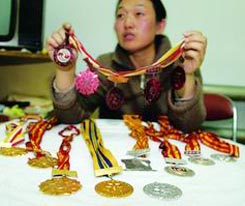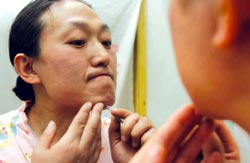| Tools: Save | Print | " target="_blank" class="style1">E-mail | Most Read |
| The Weight of Being a Strong Person |
| Adjust font size: |
|
Most people probably imagine that a champions' life is filled with flowers, cheering crowds, honors, a substantial income, anything but giving "rubdowns" in a room of a public bathhouse. In a 5-square-meter room within the bathhouse in Changchun, Jilin Province, Zou Chunlan and her husband have made their home.?A bed, a table and a small TV make up all their family belongings.
"Sometimes I have to cook two eggs to satisfy my craving for delicacies when I'm fed up with meals made up of only rice and cabbage," Zou lamented.
Zou plays a cameo type part in the bathhouse and her daily work entails her giving guests "rub downs" with a towel. It's 5 yuan (about 0.6 cents) for a bath and she earns less than 500 yuan (about US$62.4) per month. However, in this cramped and dank room there's still something which shines and makes this 35-year-old woman way above anything which could be described as ordinary. She won 10-plus weightlifting medals and among these were four golds.
"Some beautiful medals were given to relatives and they used to make me proud but today they're just painful memories of the past." Zou said, fiddling with a medal or two. Becoming a professional weightlifter at 14, she went on to win dozens of national championships. In 1988 she broke both jerk and clean lift (85kg) and total weight (152.5kg) world records in the women's 44kg category. A big year for her was 1993 and marked an important turning point in both Zou's career and her life as she was forced to retire due to injury after the Seventh National Games. Thereafter Zou was transferred to work in the weightlifters' mess until she was asked to leave at the age of 29 by the local athletic administration in 2000 with 80,000 yuan (US$9,986) in compensation. The heavy costs of her medical treatment and business losses meant the money had been spent in a short space of time. However, a fellow-villager invited her and her delivery driver husband to work in the bathhouse with free lodging and meals as part of the deal. Despite her glorious past, Zou feels her life is in fact inferior to people who've lived ordinary lives and not experienced her successes. "I received less than three years of elementary education, and I even don't know Pinyin (phonetic)," she said. What adds to Zou's bitterness is that the 1.5-meter-tall woman suffers from virilism which is a result of her taking strength-improving medicines as part of her training. With rough, thick hair, raucous voice and a beard which requires regular shaving, Zou now suffers from a huge inferiority complex.
In order to remain as female as possible, Zou depends on estrogen hormone medicines which have cost her a great deal but not improved her condition. To add to the problems she was unable to have children and there are suspicions that her infertility is a result of the medicines she took while training. These days Zou grows weak and she could hardly stand a day's work from 7 AM to 10 PM. "My heart is not good and the bathroom is stuffy," she said. "So I often felt dizzy and had difficulties with my chest." It seems Zou neglected to study or learn any skills when she was young but there are long-standing conflicts between the national sports academy system and the market economy policy that should take responsibility for Zou's difficult situation. Following the national training or sports academy methods derived from the former Soviet Union, the Chinese athletes used to be called up to the provincial or national teams and were then capable of getting jobs with the help of labor and personnel departments after they retired. Things have changed a lot since the 1980s when the market economy policy was carried out and job assignments turned into recommendations. Less than 1 percent of athletes could stay to coach and the rest had to go back to where they came from, according to an official of the Jilin provincial sports bureau, requesting anonymity. For a long time the national training system has been developed to win honors for the nation. But under the market economy system, it's hard for the retired athletes, who began training in their chosen sport when very young and were unable to receive the education available to their peers attending normal schools, to be accepted back into society and find work. Furthermore, despite that a few sports such as soccer and basketball have been professional in China, many others get little or no public attention. Declining disciplines such as weightlifting, wrestling and judo can only survive based on the sports academy system. Of the 3,000-6,000 athletes who retire each year, 40 percent do not receive timely help and statistics from the State General Administration of Sports (SGAS) show that the number of retired athletes had reached 279,000 by 2003. "To most of the athletes from the same era as Zou, life is very hard," said Ma Wenguang, director of the weightlifting, wrestling and judo administration center. Prior to Zou's tale, the most shocking case was that of the Asian Games weight-lifting champion, Cai Li, who died of obstructive sleep apnea syndrome in June 2003. The ex-athlete worked as a gatekeeper for Liaoning Institute of Sports and Athletics Technology and his family had savings of only 300 yuan (US$37) when he died. Last month the SGAS emphasized at its working conference the importance of giving medical care to both ex-athletes and coaches while continuing to improve? insurance cover for the retired. Han Dongsheng, deputy director of Jilin Sports Bureau Heavy-weight Athletic Sports Administrative Center, also pledged to promote better education for the athletes and enact relevant regulations which would make subsidies available to former athletes. Back to Zou Chunlan's plight. The Beijing Women's Federation has promised to help her establish a dry cleaning business in Changchun. Their assistance would include the supply of machinery for the venture and vocational training. The Jilin Sports Bureau will settle the housing problem and the Jilin Women's Federation assist with operating issues relating to the business. (China.org.cn by Li Xiao, April 18, 2006) |
| Tools: Save | Print | " target="_blank" class="style1">E-mail | Most Read |
 |
| Related Stories |
|




